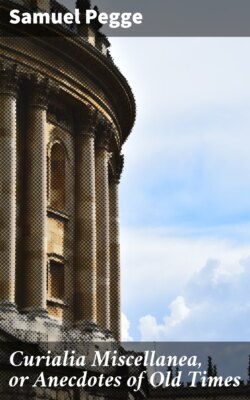Читать книгу Curialia Miscellanea, or Anecdotes of Old Times - Samuel Pegge - Страница 9
На сайте Литреса книга снята с продажи.
EXTRACTS FROM LETTERS TO MR. GOUGH.
ОглавлениеTable of Contents
Dear Sir,
Whittington, Oct. 11, 1788.
We are to have most grand doings at this place, 5th of November next, at the Revolution House, which I believe you saw when you was here. The Resolutions of the Committee were ordered to be inserted in the London prints[49]; so I presume you may have seen them, and that I am desired to preach the Sermon.
I remain your much obliged, &c.
S. Pegge.
Whittington, Nov. 29, 1788.
My dear Mr. Gough,
Mr. Rooke slept at the Vicarage on the 4th, in order to be ready for our grand celebrity the next day; and to distribute then to his friends his drawing, which he had caused to be engraved by Basire, of the Revolution House at Whittington, which he did, with a paper of mine, respecting the meeting there of the Earl of Devonshire, the Earl of Derby, &c. in 1688, annexed.
The 5th of November is now gone and over, and they said I acquitted myself very well. Indeed, I was in good spirits, and, as my Son-in-law read the prayers, I went fresh into the pulpit. The Duke of Devon was too late; but we had the Earl of Stamford at church, with Lord George and Lord John Cavendish, Lord Danby (Son of the Marquis of Carmarthen), and Lord Francis Osborne, with their Preceptor Dr. Jackson, Prebendary of Westminster, &c. The cavalcade from Whittington to Chesterfield, where we were to dine at four o'clock, was amazingly grand, no less than 50 coaches and chaises with horses dressed with orange ribbons; large and fine banners, with sundry bands of music. There were about 1000 on foot, with orange cockades, and about 300 on horseback, many of whom, besides cockades, were in blue, with orange capes. At half past six the fireworks, by an Italian artist, began, and very admirable they were; he had twenty pounds given him by the Managers. The ball room, at nine, was so crowded that, though it is large, there could be but little dancing. The ball was given to the Ladies, with an entertainment of cakes, sweetmeats, negus, &c. It was a fine day; and not the least accident happened, though it is supposed not less than 30,000 people were assembled. Hogsheads of liquor were given by the Managers at Whittington and Chesterfield, and the Duke of Devon gave twenty-four guineas to the footmen mentioned above. I saw nobody however in liquor; and when Mr. Rooke and I returned to Whittington, at one o'clock or after, we had a sober driver.
It happened to be my birth-day; which being known to some gentlemen at all the three great inns where the company dined, they drank my health with three cheers, requesting me to print my Sermon. This request I have complied with, and it is now printed at Chesterfield; I will take care that a copy be sent to you and Mr. Nichols. But I must observe to you on the occasion, that the Sermon will not read so well as it was heard, because having good command over myself at the time, I delivered it with energy and emphasis.
There will be a monument erected at the Revolution House in Whittington; a column I suppose; and 148 guineas are already subscribed. N. B. The Duke of Devon and the Earl of Stamford were excepted from subscribing, so they reluctantly desisted. Sir H. Hunloke, a Catholic, is a subscriber, and went in the cavalcade, but was not at church, as you may suppose.
We have a very fine time here, no signs of winter but the absence of leaves; the want of water however is very wonderful, considering the time of year, and is even distressing. I grow very idle and good for nothing; but, such as I am, I remain your very affectionate and much obliged servant,
S. Pegge.
Whittington, Dec. 22, 1788.
Dear Sir,
By this time I hope you are in possession of my Sermon, as I desired my Son to send one copy to you, and another to Mr. Nichols. If I know you, your sentiments in politics coincide with mine; so that I have no fear of your concurrence in that respect and have only to wish that the composition may please you.
I am, dear Sir, your truly affectionate and much obliged servant,
S. Pegge.
